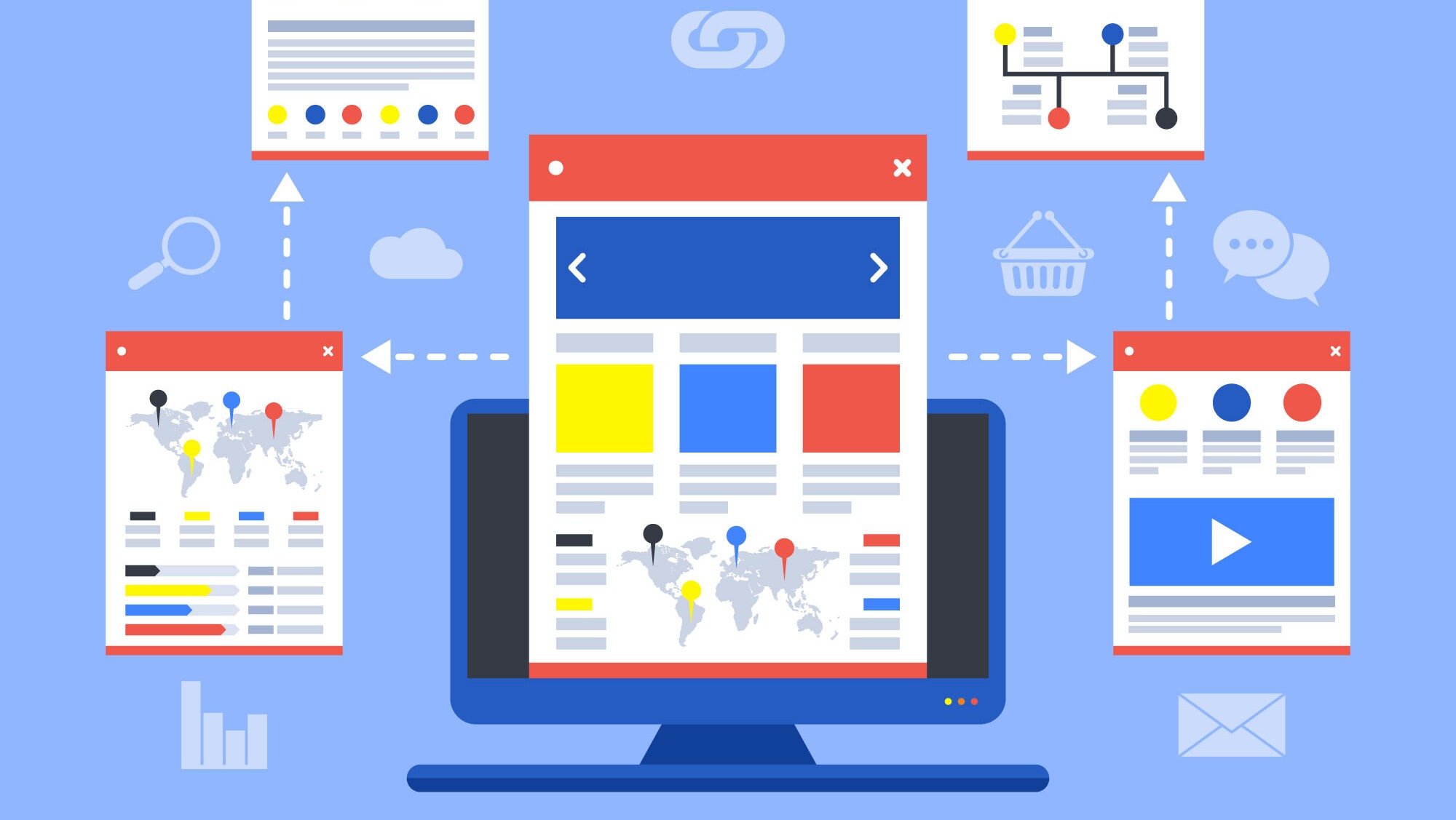
Are backlinks important for SEO in 2025
Are backlinks important for SEO in 2025
Few elements in search engine optimisation have sparked as much debate, sustained impact, and ongoing innovation as backlinks. Their function has grown well beyond simple vote-counting. With the search landscape rapidly shifting in 2025, the role of backlinks remains compelling, yet substantially different from what many remember.
The weight of a link profile can often make or break a website’s organic visibility. While Google’s algorithms have matured, and artificial intelligence can parse content relevance more shrewdly than ever, there’s still plenty that’s misunderstood about the modern function of backlinks.
Let’s look into why backlinks still command attention, what’s changed, what remains constant, and where link strategies are heading next.
Foundations: Why Backlinks Matter
From Google’s earliest years, links were the backbone of PageRank, essentially acting like academic citations, reinforcing that someone found a page valuable or trustworthy enough to reference. That simple concept laid the groundwork for ranking pages by popularity, credibility, and authority.
Today, that foundation still stands — but with significant overlays. Search engines have become dramatically more nuanced, evaluating not only the presence of links but the quality, context, and intent behind them. Relevance matters more than ever, and blind accumulation of links has faded in significance.
But despite evolving sophistication, three consistent themes persist for why backlinks continue to impact SEO:
- Credibility: Trusted links from reputable domains signal reliability.
- Authority/Expertise: Earning links within a particular sector or topic signals knowledge leadership.
- Discovery: Links lead real users (and bots) to your content, multiplying the paths by which a website can be found.
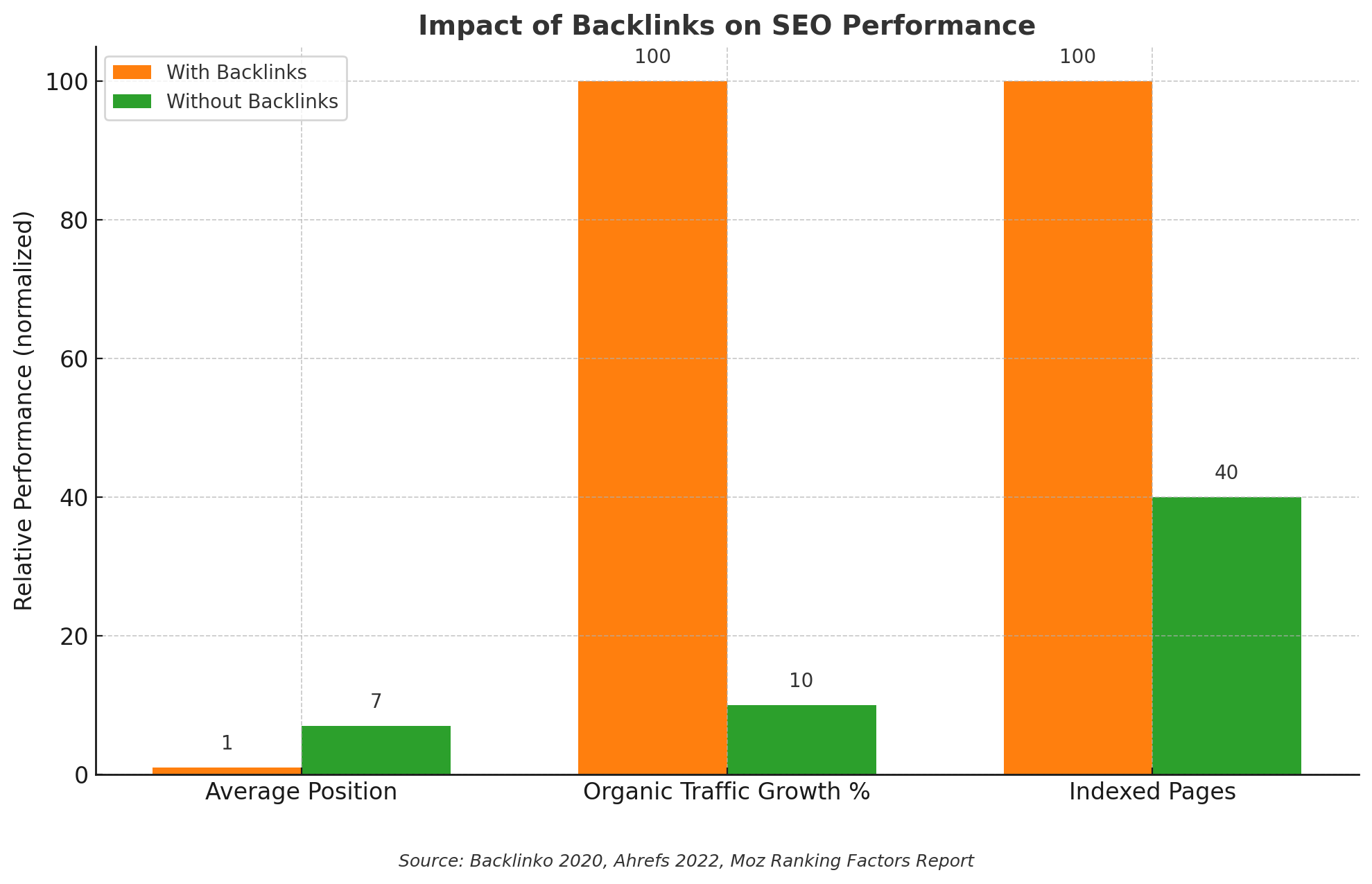
Are Backlinks Important for SEO in 2025?
Absolutely—backlinks remain a critical factor for SEO in 2025. While search engine algorithms have become more sophisticated, the fundamental value of backlinks endures. High-quality backlinks from reputable, relevant sources continue to signal trust, authority, and credibility to search engines. They help validate your website’s expertise and play a decisive role in determining organic rankings, especially in competitive niches.
However, what matters most in 2025 is not just the presence of backlinks, but their quality, context, and the authenticity of the relationships they represent. Search engines now evaluate the intent behind each link, the relevance of the referring site, and the engagement generated by those links. Earning backlinks through genuine authority, valuable content, and real-world partnerships is more important than ever.
In summary, backlinks are still important for SEO in 2025—but only when earned through ethical, strategic, and value-driven efforts.
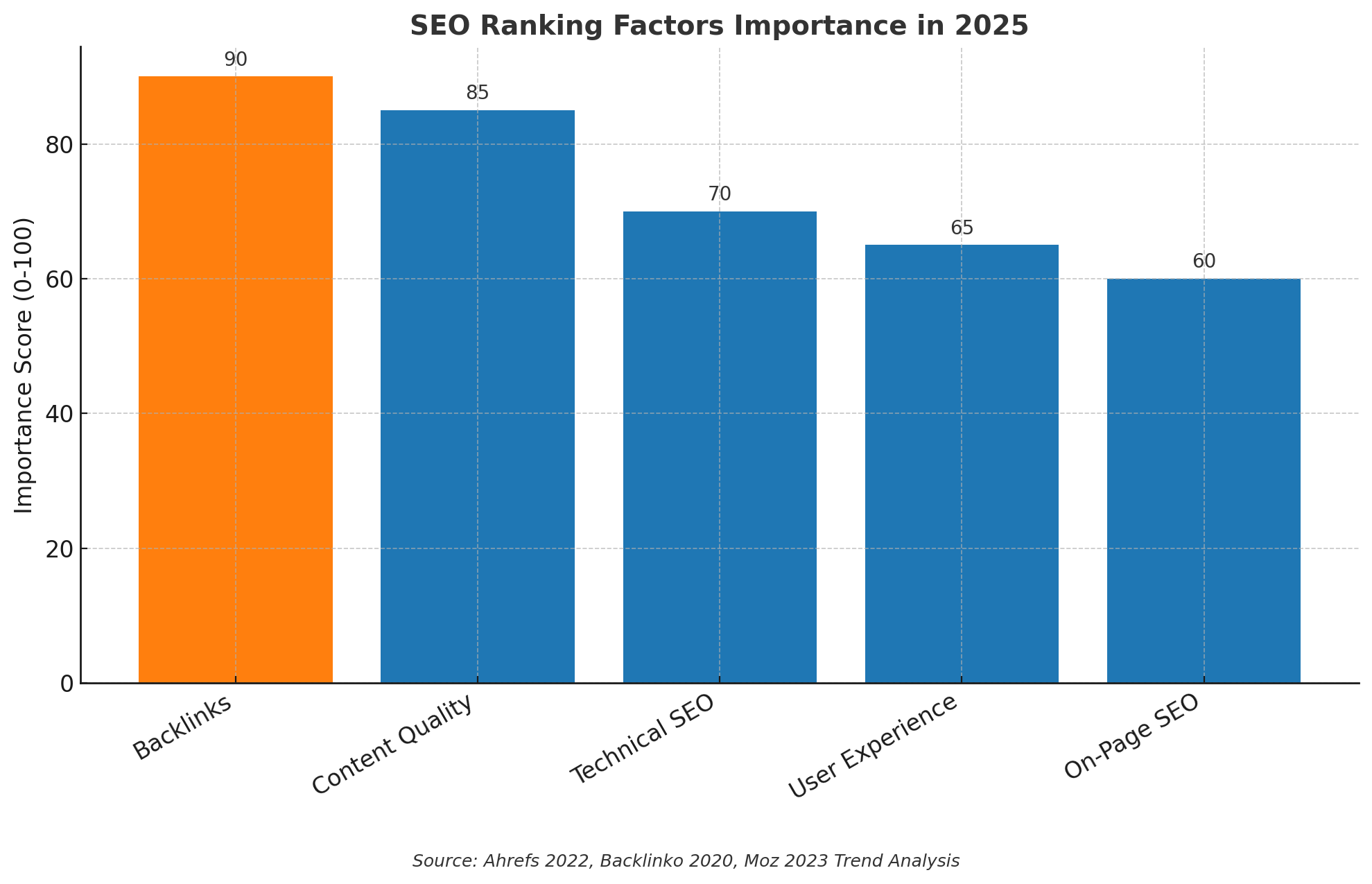
How Search Engines Treat Links in 2025
Many anticipated that machine learning would eventually make backlinks obsolete, expecting nuanced algorithms to rely exclusively on on-page signals and user interaction data.
So far, that prediction looks off the mark. While page experience and behaviour are certainly more heavily weighted than before, modern search engines still treat links as one of a variety of external validators. They use links to corroborate topical authority, check for community trust, and even evaluate the accuracy of content.
Here’s how the broader role of backlinks has evolved for 2025:
| Year | Focus on Links | Key Algorithm Trends |
|---|---|---|
| 2015 | Quantity, Domain Authority, Anchor Text | Penguin penalties, anchor overuse worries |
| 2020 | Quality over quantity, Niche relevance | E-A-T, contextual linking, AI-based content assessment |
| 2025 | Context, Relationship, User engagement from links, Real-world presence | Machine learning, link intent, sentiment analysis, human signal |
Search engines have grown far more sophisticated in detecting link manipulation, private blog networks, paid links, and unnatural patterns. Links not earned organically or built with genuine editorial motivation increasingly struggle to pass muster. If anything, the shift is towards recognising real-world relationships — links that echo authentic partnerships, collaborations, and expertise.
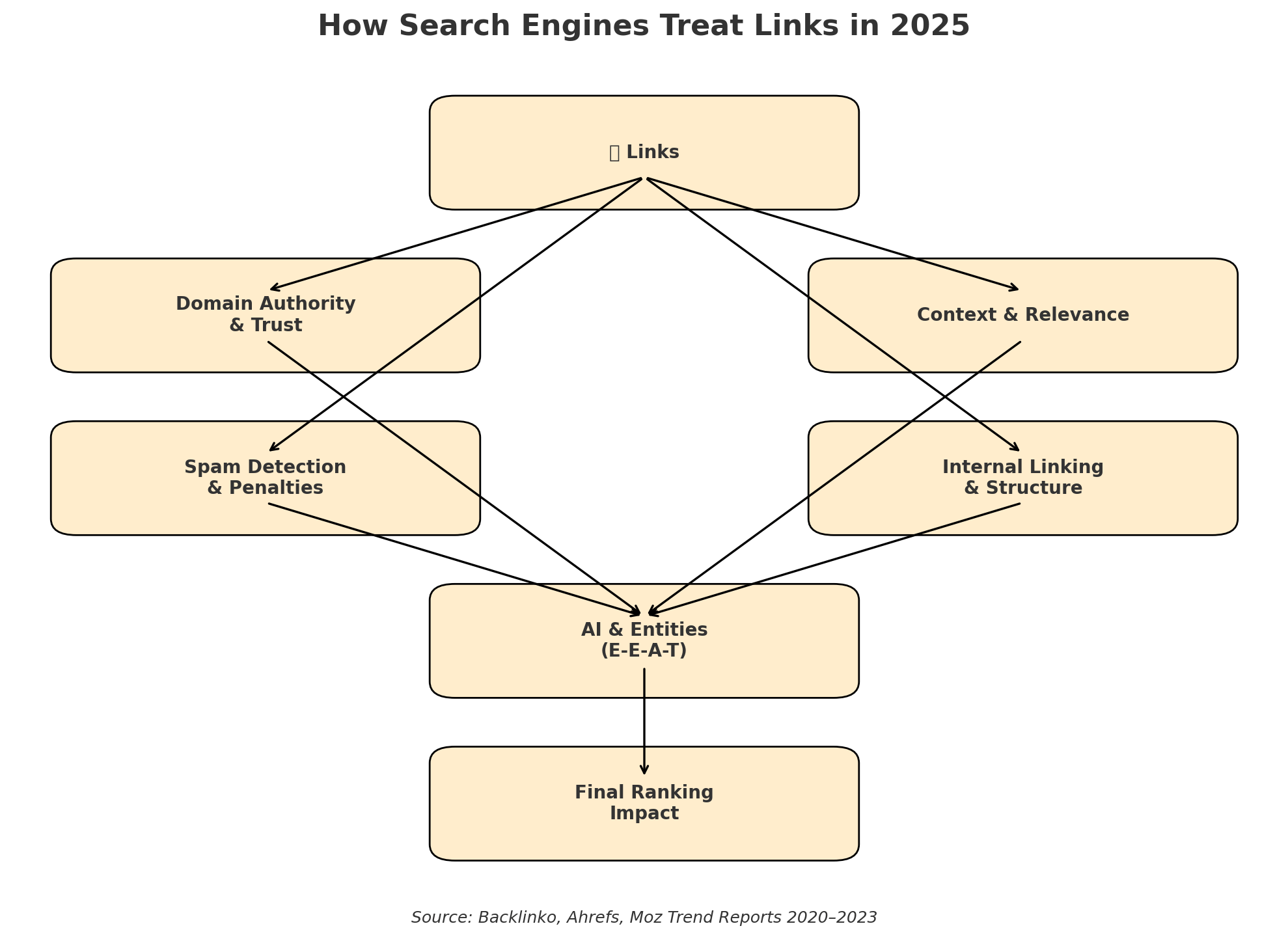
Not All Links Carry Equal Weight
One thing that remains unchanged: not every backlink supports your search performance to the same degree.
In 2025, search engines pay attention to:
- Relevance: Does the referring site operate within a similar industry or topic as your own?
- Traffic Signals: Do visitors actually click on the link, and do they engage with your site after arriving?
- Link Placement: Are links embedded within high visibility, editorial content — or buried in obscure footers?
- Diversity: Is your link profile built from a realistic mix of sources, rather than a concentration from one type of site?
- Sentiment and Context: Is the link surrounded by positive commentary, or is it part of a negative review or dubious context?
One quality link from a respected site in your sector is more valuable than hundreds from comment sections, irrelevant directories, or low-quality blogs.
Earning Trust and Building Authority
The measure of a website’s authority is no longer just link count. Leading search engines are now adept at evaluating why a site gets linked, interpreting the trustworthiness of both the source and the target.
Practical strategies that consistently deliver valuable, sustainable backlinks focus on building real authority and relationships:
- Thought Leadership: Contribute original research, industry insights, and data-driven articles that others reference organically.
- Collaborative Projects: Host webinars, guides, and interviews with respected figures in your space, which naturally attract links from their networks.
- Community Engagement: Participate in industry forums, events, and groups where your expertise can be cited and shared.
- Media and PR: Pitch meaningful stories to journalists and bloggers, offering expert quotes or trending news angles within your area of expertise.
These tactics aim for more than a backlink—they foster credibility, broaden recognition, and help your site become an established name in its field.
Risks: Penalties and Lost Trust
The temptation to shortcut link building with automation or paid schemes is ever-present. Yet in 2025, it’s riskier than ever before.
Modern algorithms are particularly effective at uncovering link networks, unnatural spikes, and exchange patterns. Google and other engines have ramped up manual reviews and now even employ AI for real-time monitoring and retroactive penalties.
Violations can cause:
- Significant ranking drops across all targeted pages.
- Delisting from search indexes in extreme cases.
- Long-term damage to brand reputation online.
Defensive tactics make sense: regularly audit your backlink profile, monitor for suspicious new links, and use disavow tools when harmful associations arise. Prevention beats repair every time.
Local SEO and Niche Expertise
While authority matters on a global stage, for businesses focused on New Zealand markets or specific regions, local relevance is every bit as important.
Backlinks from well-regarded Kiwi media, local blogs, council sites, or business associations help Google understand a company’s position within its actual service area. These indicate trust at a community level and support rankings in “near me” queries and map results.
Other factors that support local search include:
- Listings in reputable local business directories.
- Coverage by popular regional publications.
- Testimonials and case studies shared by other local businesses.
Combining robust local backlinks with a well-optimised Google Business Profile and consistently positive reviews solidifies a company’s reputation both online and offline.
Linkless Mentions: The Silent Validator
A significant development in recent years is search engines’ growing attention to brand mentions — even those not hyperlinked.
If reputable sources reference a business, product, or service, algorithms can attribute value to those citations, treating them as indirect signals of popularity and trustworthiness. While these “linkless backlinks” don’t carry the same direct transfer of authority, they still complement a holistic SEO strategy.
For visibility and credibility in 2025, pursue publicity and mention opportunities, knowing that while not every citation needs to be clickable, they all contribute to the perception of legitimacy.
Integrating Backlinks with Other Ranking Signals
No website succeeds through links alone.
Google and its competitors assess dozens of signals: content quality, mobile-friendliness, page load time, accessibility, user satisfaction, and more. Backlinks act as one part of this mix, often tipping the balance for competitive queries when everything else is equal.
Sites in 2025 that combine link-building with:
- Rich, original content serving clear search intent
- Fast, stable, and accessible user experience
- Clear demonstration of expertise and credibility
- Consistent local or niche authority
stand out among their peers.
The upshot? Backlinks are most impactful when they reinforce a robust site with genuine value for users — not as standalone metrics to be gamed.
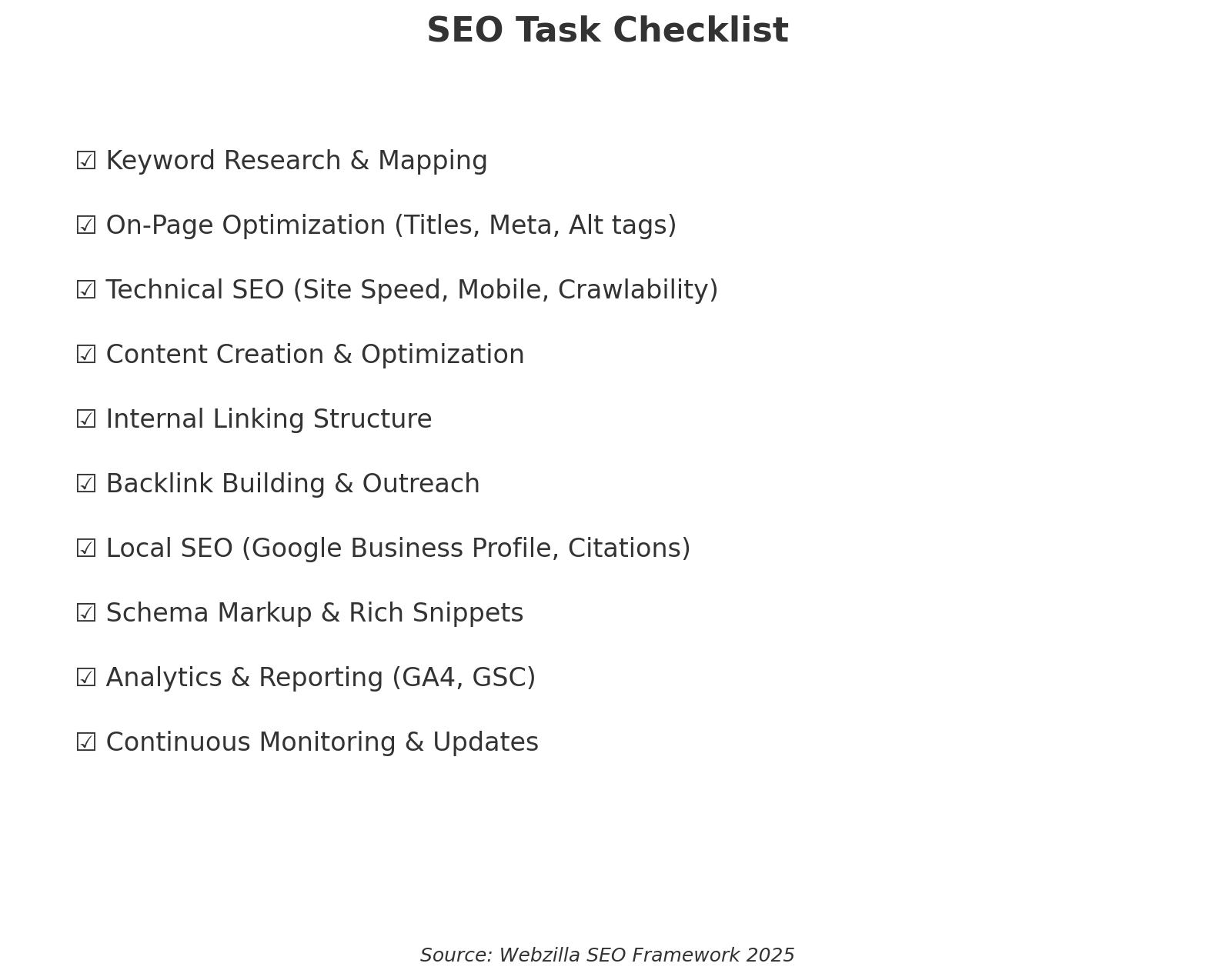
Smart Link Building in 2025
Success no longer comes from chasing numbers or replicating competitor sites. Instead, forward-thinking strategies focus on earning links, not buying, swapping, or requesting them indiscriminately.
Some effective methods for this year include:
- Hosting community discussions or AMAs that draw real engagement.
- Publishing interactive tools and calculators others find useful.
- Contributing to trusted expert roundups or niche industry panels.
- Building long-term relationships with influencers, rather than transactional campaigns.
Automated outreach is outpaced by tailored communication and creative collaboration. Consistency and authenticity carry far more weight than volume.
Mindful Management: Ongoing Audits and Adaptation
The most successful site owners and marketers don’t treat links as tick-the-box tasks, but as part of a living digital reputation. Regular backlink audits, even for high authority brands, protect against outdated associations, competitor sabotage, or shifting best practices.
Tools exist now that use AI to predict emerging risks, surface unnatural patterns, and even gauge the potential impact of new or lost links. Setting up alerts and periodic reviews lets you stay ahead, adjusting tactics as trends and search engine expectations adjust.
The Path Ahead for SEO Professionals
Those working in digital strategy across New Zealand see rising standards for what can rightly be called “quality links”. Editors, journalists, and webmasters are less likely to provide backlinks without compelling reasons, raising the bar for content quality and genuine authority.
As AI continues to shape how algorithms interpret signals both on and off page, the future promises even deeper scrutiny of link value, sentiment, and authenticity.
There remains a place for smart, strategic linking — especially when built on real expertise, trusted partnerships, and content that sparks genuine interest. While the tactics may change, the core principle stands: trusted connections, both digital and human, elevate SEO success for 2025 and beyond.
If you have any questions or need tailored advice, feel free to contact our Google SEO expert for personalised guidance.

